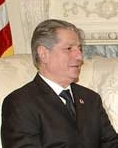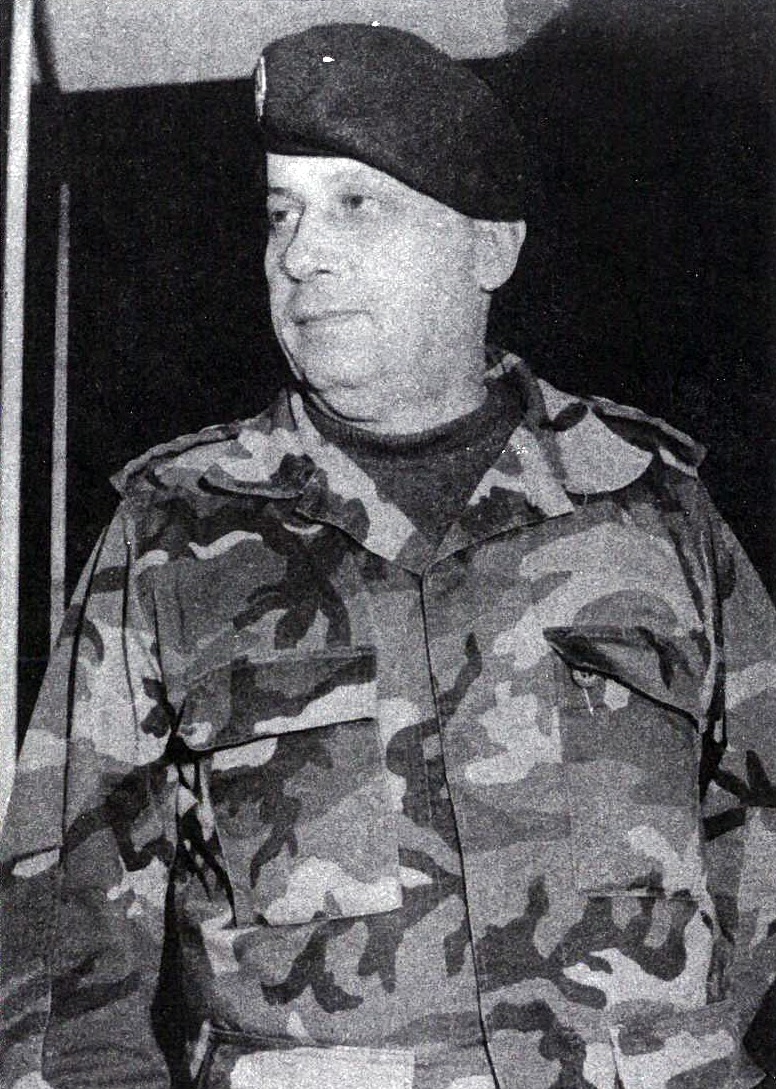|
Taif Agreement
The Taif Agreement ( ar, اتفاق الطائف), officially known as the ( ar, وثيقة الوفاق الوطني, label=none'')'', was reached to provide "the basis for the ending of the civil war and the return to political normalcy in Lebanon". Negotiated in Taif, Saudi Arabia, it was designed to end the decades-long Lebanese Civil War, reassert Lebanese government authority in southern Lebanon, which was controlled at the time by the Christian-separatist South Lebanon Army under the occupational hegemony of Israel. Though the agreement set a time frame for withdrawal of Syrian military forces from Lebanon, stipulating that the Syrian occupation end within two years, Syria did not withdraw its forces from the country until 2005. It was signed on 22 October 1989 and ratified by the Lebanese parliament on 5 November 1989. Overview The treaty was fathered by the Speaker of the Parliament Hussein El-Husseini and negotiated in Ta'if, Saudi Arabia, by the surviving members o ... [...More Info...] [...Related Items...] OR: [Wikipedia] [Google] [Baidu] |
Lebanese Civil War
The Lebanese Civil War ( ar, الحرب الأهلية اللبنانية, translit=Al-Ḥarb al-Ahliyyah al-Libnāniyyah) was a multifaceted armed conflict that took place from 1975 to 1990. It resulted in an estimated 120,000 fatalities and an exodus of almost one million people from Lebanon. The diversity of the Lebanese population played a notable role in the lead-up to and during the conflict: Sunni Muslims and Christians comprised the majority in the coastal cities; Shia Muslims were primarily based in the south and the Beqaa Valley in the east; and Druze and Christians populated the country's mountainous areas. The Lebanese government had been run under the significant influence of elites within the Maronite Christian community. The link between politics and religion had been reinforced under the French Mandate from 1920 to 1943, and the country's parliamentary structure favoured a leading position for its Christian-majority population. However, the country had a ... [...More Info...] [...Related Items...] OR: [Wikipedia] [Google] [Baidu] |
France
France (), officially the French Republic ( ), is a country primarily located in Western Europe. It also comprises of Overseas France, overseas regions and territories in the Americas and the Atlantic Ocean, Atlantic, Pacific Ocean, Pacific and Indian Oceans. Its Metropolitan France, metropolitan area extends from the Rhine to the Atlantic Ocean and from the Mediterranean Sea to the English Channel and the North Sea; overseas territories include French Guiana in South America, Saint Pierre and Miquelon in the North Atlantic, the French West Indies, and many islands in Oceania and the Indian Ocean. Due to its several coastal territories, France has the largest exclusive economic zone in the world. France borders Belgium, Luxembourg, Germany, Switzerland, Monaco, Italy, Andorra, and Spain in continental Europe, as well as the Kingdom of the Netherlands, Netherlands, Suriname, and Brazil in the Americas via its overseas territories in French Guiana and Saint Martin (island), ... [...More Info...] [...Related Items...] OR: [Wikipedia] [Google] [Baidu] |
Parliamentary Republic
A parliamentary republic is a republic that operates under a parliamentary system of government where the executive branch (the government) derives its legitimacy from and is accountable to the legislature (the parliament). There are a number of variations of parliamentary republics. Most have a clear differentiation between the head of government and the head of state, with the head of government holding real power, much like constitutional monarchies (however in some countries the head of state, regardless of whether the country's system is a parliamentary republic or a constitutional monarchy, has 'reserve powers' given to use at their discretion in order to act as a non-partisan 'referee' of the political process and ensure the nation's constitution is upheld). Some have combined the roles of head of state and head of government, much like presidential systems, but with a dependency upon parliamentary power. For the first case mentioned above, the form of executive-branch a ... [...More Info...] [...Related Items...] OR: [Wikipedia] [Google] [Baidu] |
Figurehead
In politics, a figurehead is a person who ''de jure'' (in name or by law) appears to hold an important and often supremely powerful title or office, yet ''de facto'' (in reality) exercises little to no actual power. This usually means that they are head of state, but not head of government. The metaphor derives from the carved figurehead at the prow of a sailing ship. Examples Monarchs in some constitutional monarchies, and presidents in parliamentary republics are often considered to be figureheads. Commonly cited figureheads include Queen Elizabeth II, who was queen of 15 Commonwealth realms and head of the Commonwealth, but had no power over the nations in which she was not head of government and did not exercise power in her own realms on her own initiative. Other figureheads include the Emperor of Japan and the King of Sweden, as well as presidents in a majority of parliamentary republics, such as the presidents of India, Israel, Bangladesh, Greece, Hungary, Germany, Austria ... [...More Info...] [...Related Items...] OR: [Wikipedia] [Google] [Baidu] |
Council Of Ministers Of Lebanon
The Council of Ministers of Lebanon ( ar, مجلس الوزراء اللبناني, Majlis al-wozarah al-Lubnanī; french: Conseil des Ministres du Liban) is the executive body of the Republic of Lebanon. Its president is the Prime Minister of Lebanon, and it is appointed by the President of Lebanon and the Prime Minister of Lebanon. The appointed government also has to pass a confidence vote in the Parliament of Lebanon. As stipulated in Article 95 of the Lebanese constitution, there are two requirements for the council of ministers to be considered constitutional: 1-It has to be composed of an equal number of muslim and christian ministers 2-The different sects of Lebanon shall be represented in a just and equitable manner in the formation of the Cabinet. The Council of Ministers is considered to be the "government" of Lebanon by the Constitution. History The body was created on 23 May 1926, when the Constitution of the state of Greater Lebanon was promulgated. From th ... [...More Info...] [...Related Items...] OR: [Wikipedia] [Google] [Baidu] |
As'ad AbuKhalil
As'ad AbuKhalil ( ar, أسعد أبو خليل) (born 16 March 1960) is a Lebanese-American professor of political science at California State University, Stanislaus. AbuKhalil is the author of ''Historical Dictionary of Lebanon'' (1998), ''Bin Laden, Islam & America's New "War on Terrorism"'' (2002), and ''The Battle for Saudi Arabia'' (2004). Biography AbuKhalil is a professor at California State University, Stanislaus, and was briefly a visiting professor at UC Berkeley.Robin AbcariaBetween disparate worlds Los Angeles Times (2005-06-07). Retrieved on 2011-10-17. Political views AbuKhalil describes himself as "a former Marxist–Leninist who is now an anarchist"."A Statue to Reason" Ken Silverstein, Harper's Magazine, 2006-07-13 He is an opponent of th ... [...More Info...] [...Related Items...] OR: [Wikipedia] [Google] [Baidu] |
Universal Suffrage
Universal suffrage (also called universal franchise, general suffrage, and common suffrage of the common man) gives the right to vote to all adult citizens, regardless of wealth, income, gender, social status, race, ethnicity, or political stance, subject only to certain exceptions as in the case of children, felons, and for a time, women.Suffrage ''Encyclopedia Britannica''. In its original 19th-century usage by reformers in Britain, ''universal suffrage'' was understood to mean only ; the vote was extended to women later, during the |
Amine Gemayel
Amine Pierre Gemayel ( ar, أمين بيار الجميٌل ; (born 22 January 1942) is a Lebanese Maronite politician who served as President of Lebanon from 1982 to 1988. Born in Bikfaya, his father was Pierre Gemayel, the founder of the Kataeb Party. He worked as a lawyer, then was elected as a deputy for Northern Metn in 1970 by-election, following the death of his uncle, Maurice Gemayel, and once again in the 1972 general election. At the start of the Lebanese Civil War, the Phalanges were a member of the Lebanese Front, allied with Syria against the leftist National Movement. However, Syria became their enemy, while they started receiving the support of Israel. This phase saw the rise of his brother, Bachir, who had disputes with Amine about the military leadership, such as uniting the Christian militias by force. In 1982, Bachir was elected to presidency, but was assassinated before taking office. Endorsed by the United States and Israel, he was elected on 23 September ... [...More Info...] [...Related Items...] OR: [Wikipedia] [Google] [Baidu] |
Michel Aoun
Michel Naim Aoun ( ar, ميشال نعيم عون ; born 30 September 1933) is a Lebanese politician and former military general who served as the President of Lebanon from 31 October 2016 until 30 October 2022. Born in Haret Hreik to a Maronite Christian family, Aoun joined the Military Academy in 1955 and graduated as an artillery officer in the Lebanese Army. In 1984, he became the youngest Commander of the Army, at the age of 49 years. On 22 September 1988 during the fourth phase of the Lebanese Civil War, the departing President Amine Gemayel appointed him as the interim Prime Minister of a Military Government, after the parliament failed to elect a new president, and dismissed the current government headed by the Acting Prime Minister Selim Hoss. This controversial decision saw the rise of two rival governments contending for power at that time, with Aoun being supported mainly by Christians and Iraq, while the other being supported by Muslims and Syria. He declared ... [...More Info...] [...Related Items...] OR: [Wikipedia] [Google] [Baidu] |
Sunni Islam In Lebanon
Lebanese Sunni Muslims ( ar, المسلمون السنة اللبنانيين) refers to Lebanese people who are adherents of the Sunni branch of Islam in Lebanon, which is one of the largest denomination in Lebanon tied with Shias. Sunni Islam in Lebanon has a history of more than a millennium. According to a CIA 2018 study, Lebanese Sunni Muslims constitute an estimated 30.6% of Lebanon's population. (However, in a country that had last census in 1932, it is difficult to have correct population estimates) The Lebanese Sunni Muslims are highly concentrated in Lebanon's capital city - Beirut (West Beirut /or Beirut II). As well as Tripoli, Sidon, Western Beqaa, and in the countryside of the Akkar, Arsal. And a notable presence in Zahlé, Southern Lebanon, Marjaayoun and Chebaa. Under the terms of an unwritten agreement known as the National Pact between the various political and religious leaders of Lebanon, Sunni notables traditionally held power in the Lebanese state toget ... [...More Info...] [...Related Items...] OR: [Wikipedia] [Google] [Baidu] |
Maronite Christianity In Lebanon
Lebanese Maronite Christians ( ar, المسيحية المارونية في لبنان; syc, ܡܫܝܚܝ̈ܐ ܡܪ̈ܘܢܝܐ ܕܠܒܢܢ) are adherents of the Maronite Church in Lebanon, which is the largest Christian denomination in the country. The Maronite Church is an Eastern Catholic Church in full communion with the worldwide Catholic Church. The Lebanese Maronite Christians are believed to constitute about 30% of the total population of Lebanon according to election results. Lebanon's constitution was intended to guarantee political representation for each of the nation's ethno-religious groups. The Maronite Catholics and the Druze founded modern Lebanon in the early eighteenth century, through the ruling and social system known as the " Maronite-Druze dualism" in Mount Lebanon Mutasarrifate. Under the terms of an unwritten agreement known as the National Pact between the various political and religious leaders of Lebanon, the president of the country must be a Maronite. ... [...More Info...] [...Related Items...] OR: [Wikipedia] [Google] [Baidu] |





